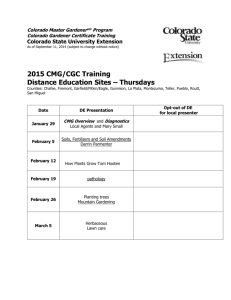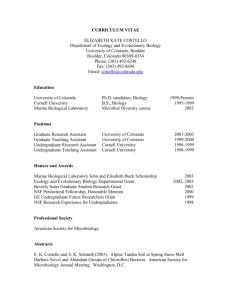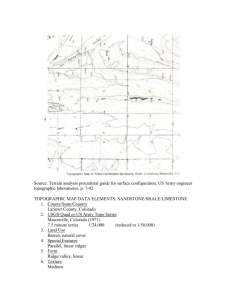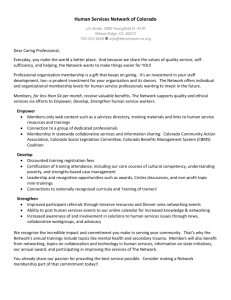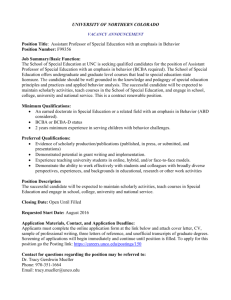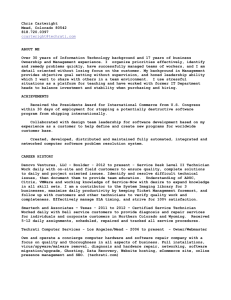HBCU Research Partnership Bios
advertisement
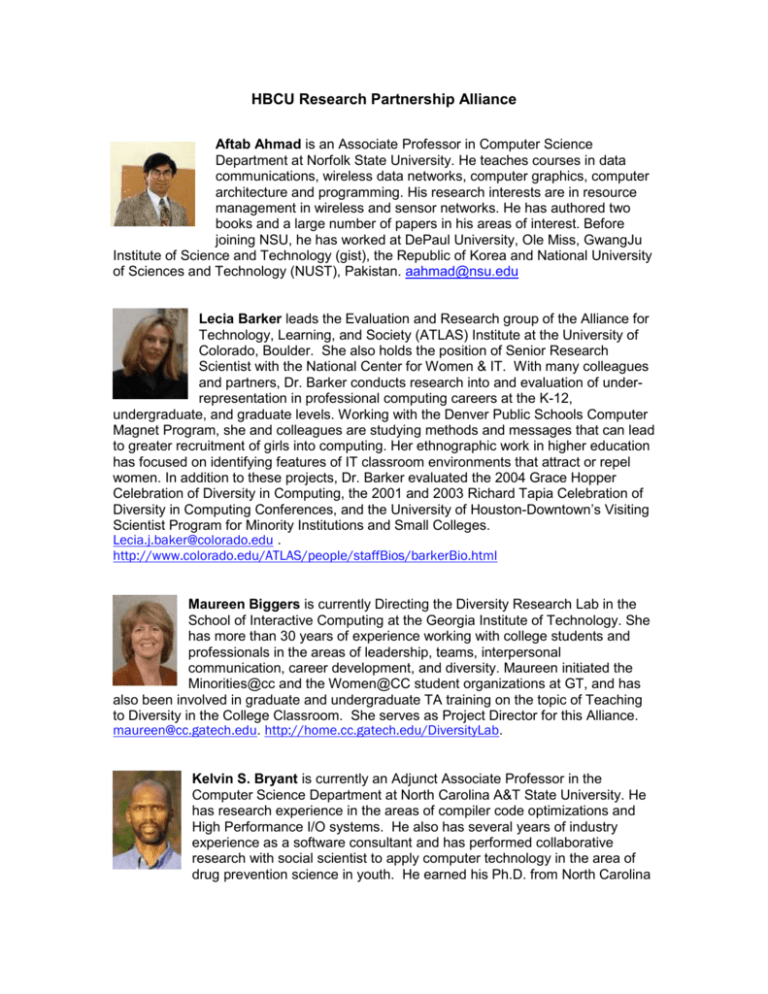
HBCU Research Partnership Alliance Aftab Ahmad is an Associate Professor in Computer Science Department at Norfolk State University. He teaches courses in data communications, wireless data networks, computer graphics, computer architecture and programming. His research interests are in resource management in wireless and sensor networks. He has authored two books and a large number of papers in his areas of interest. Before joining NSU, he has worked at DePaul University, Ole Miss, GwangJu Institute of Science and Technology (gist), the Republic of Korea and National University of Sciences and Technology (NUST), Pakistan. aahmad@nsu.edu Lecia Barker leads the Evaluation and Research group of the Alliance for Technology, Learning, and Society (ATLAS) Institute at the University of Colorado, Boulder. She also holds the position of Senior Research Scientist with the National Center for Women & IT. With many colleagues and partners, Dr. Barker conducts research into and evaluation of underrepresentation in professional computing careers at the K-12, undergraduate, and graduate levels. Working with the Denver Public Schools Computer Magnet Program, she and colleagues are studying methods and messages that can lead to greater recruitment of girls into computing. Her ethnographic work in higher education has focused on identifying features of IT classroom environments that attract or repel women. In addition to these projects, Dr. Barker evaluated the 2004 Grace Hopper Celebration of Diversity in Computing, the 2001 and 2003 Richard Tapia Celebration of Diversity in Computing Conferences, and the University of Houston-Downtown’s Visiting Scientist Program for Minority Institutions and Small Colleges. Lecia.j.baker@colorado.edu . http://www.colorado.edu/ATLAS/people/staffBios/barkerBio.html Maureen Biggers is currently Directing the Diversity Research Lab in the School of Interactive Computing at the Georgia Institute of Technology. She has more than 30 years of experience working with college students and professionals in the areas of leadership, teams, interpersonal communication, career development, and diversity. Maureen initiated the Minorities@cc and the Women@CC student organizations at GT, and has also been involved in graduate and undergraduate TA training on the topic of Teaching to Diversity in the College Classroom. She serves as Project Director for this Alliance. maureen@cc.gatech.edu. http://home.cc.gatech.edu/DiversityLab. Kelvin S. Bryant is currently an Adjunct Associate Professor in the Computer Science Department at North Carolina A&T State University. He has research experience in the areas of compiler code optimizations and High Performance I/O systems. He also has several years of industry experience as a software consultant and has performed collaborative research with social scientist to apply computer technology in the area of drug prevention science in youth. He earned his Ph.D. from North Carolina State University and completed a Postdoctoral Fellowship at the University of Maryland, College Park. ksbryant@ncat.ed. Gerry Dozier is the Principal Investigator for the Alliance and the Computer Science Department Chairman at North Carolina A&T State University. He recently moved from Auburn University where he taught and performed research in the areas of Artificial Intelligence, Evolutionary Computation, Distributed Constraint Reasoning, Artificial Immune Systems, Machine Learning and Intrusion Detection. He earned his Ph.D. from North Carolina State University and worked in the A&T Computer Science Department from August 1995 until May 1997. gvdozier@ncat.edu. http://www.eng.auburn.edu/~gvdozier. George C. Harrison is the Head of the Department of Computer Science at Norfolk State University. He is a full professor and has taught at NSU for over thirty-two years. He is closely involved in a research project designed to retain more women and minorities in computer science programs at both Old Dominion University and NSU. He has considerable experiences in three-dimensional modeling and scientific visualization especially in the theoretical aspects and practical applications of these areas and in persuasive and affective computing. He led many thesis students in these areas and in applications of genetic algorithms and XML databases. He is a member of the Association for Computing Machinery, the IEEE Computer Society and the Phi Kappa Phi Honor Society. gcharrison@ncat.edu. Dr. C. Marlow Hinton is the Director of Support Services in the Div. of Information at North Carolina A&T State University. He currently leads over 30 technical professionals including the University technical support and an innovative student technical service team of over 50 students. He also oversees the academic and research computational laboratories on campus as well as the Student Technical Services organization. He is an Associate Professor in the Dept. of Computer Science where he teaches courses in ‘Software Project Management’ and ‘Ethics for the Information Age’ in the Computer Science Dept in the School of Engineering. He has a strong background in database systems, grid computing, and project management and has taught courses and has published papers in these respective areas. He has over 30 years in industry and academia and is a PMP (Project Management Professional). He also served as the Director of Research Computing and the leader of the team for implementing high performance and grid computing for multidisciplinary research at the University. He has been instrumental in the creation the high performance computing center, the visualization laboratory, the new Computational Science/Engineering Masters degree Program. mhinton@ncat.edu. Elizabeth (Liz) Jessup is Professor in the Department of Computer Science at the University of Colorado at Boulder (UCB). Her research interests are design, analysis, and implementation of algorithms and efficient software for matrix algebra problems. Her present work focuses on developing memory-efficient matrix algebra algorithms. Liz has also been actively involved in undergraduate education, beginning with her role as co-developer of an award-winning, NSF-funded undergraduate curriculum in high-performance scientific computing. She has since created a linear algebra course with computer science applications designed to illustrate the importance of linear algebra to math-reluctant computer science majors. She also worked with the Anita Borg Institute for Women and Technology to expand its Virtual Development Center to UCB through a project-based course in which students provided computational solutions to problems confronting local social service organizations. jessup@cs.colorado.edu. www.cs.colorado.edu/~jessup/. Dennis Kafura is the Head of the Department of Computer Science at Virginia Polytechnic Institute and State University. He holds professional association memberships with the Association for Computing Machinery and the IEEE Computer Society. He has published papers in both the major European (ECOOP) and American (OOPSLA) conferences. Dr. Kafura is the author of Object-Oriented Software Design and Construction with C++, and ObjectOriented Software Design and Construction with Java. kafura@cs.vt.edu. www.cs.vt.edu/~kafura/. Sondra M. Lancaster started her tenure with UNCF Special Programs Corporation (UNCFSP) in July 2003. She currently serves as the Research and Technology Manager in the Science and Technology Division where she provides management support for several federallyfunded higher-education programs. Prior to that position, she served as the Assistant Manager for NASA Programs where she provided management support for the three of NASA’s higher education programs – the NASA Administrator’s Fellowship Program (NAFP), the Harriett G. Jenkins Pre-doctoral Fellowship Program (JPFP) and the Curriculum Improvement Partnership Award Program (CIPA). While in that position, she also served as the Manager of the Integrated Communication Technology Center (ICTC), a $1.5M facility that facilitates the telecommunication capabilities of the corporation. From 2001-2003, Ms. Lancaster was a Manager with Marine Corps Community Services (MCCS), a contract organization with the U.S. Marine Corps at Camp Pendleton, CA. In this capacity, she was responsible for the operation, management, and maintenance of a community center facility which supported more than 1,400 military family members. Overall, Ms. Lancaster has more than 10 years experience handling various levels of administrative and program management responsibilities for government, private industry and military organizations. She has received training in Executive Management, Project Management and Leadership Skills and holds a Bachelor’s of Arts degree from the University of Maryland University College. Sondra.lancaster@uncfsp.org. Byong Lee is an associate professor in the department of mathematics and computer science at Bennett College for Women, Greensboro NC. She has 17 years of teaching experience in the United States, including 13 years at Bennett College for Women. Dr. Lee earned her Master’s degree in computer science at University of Nebraska, Lincoln, and her doctoral degree in Computer Science Education at Florida Institute of Technology. Dr. Lee’s professional interest is in computer science undergraduate education, especially for underrepresented group. She is a member of Associate for Computing Machinery (ACM) and ACM Special Interests Group of Computer Science Education (SIGCSE). She has been involved in several government funded projects. She served as the computer science area coordinator for NSF HBCU-UP grant and the primary investigator for a service learning project (SEAMS). At present, Dr. Lee is serving as Co-PI for NSF CSEM grant (PASS) at Bennett College. blee@bennett.edu. Clayton Lewis is a Professor in the Department of Computer Science and Institute of Cognitive Science at the University of Colorado, Boulder. His research and teaching interests are Game Design for Education, Cognitive Assistive Technology, Human-Computer Interaction and Educational Technology. He holds a Ph.D. in Experimental Psychology from the University of Michigan. clayton@cs.colorado.edu. http://spot.colorado.edu/~clayton/. Mahmoud A. Manzoul is a Professor of Computer Engineering and Chair of the Department of Computer Engineering at Jackson State University. Dr. Manzoul was born in Sudan and received his BS degree in Electrical Engineering from the University of Khartoum, Sudan. He received MSEE and Ph.D. degrees in Electrical Engineering from West Virginia University. Dr. Manzoul is the founding Chair of the Department of Computer Engineering at Jackson State University. Before joining Jackson State University, Dr. Manzoul was with Southern Illinois University at Carbondale. During his tenure at Southern Illinois University he spent two years with the United Arab Emirates University and one year with the American University of Sharjah in the United Arab Emirates. Dr. Manzoul has taught graduate and undergraduate courses in Computer Architecture; Logic Design; Microprocessor Based Design; Switching and Finite Automata Theory; Fault Tolerant Digital Systems; Computer Aided Design of Digital VLSI Systems; Testing of Digital Systems, and Electric Circuits. His research interests include computer architecture, computer arithmetic, hardware of fuzzy systems, Field Programmable Gate Arrays, digital VLSI, and embedded computing systems. mmanzoul@jsums.edu. Scott McCrickard is an Assistant Professor in the Department of Computer Science at Virginia Polytechnic Institute and State University. His research vision is to lead the emergence of the notification systems research field to a position marked by cohesive community effort, scientific method, and focus on relevant, real-world problems--providing improved system interfaces and engineering processes. He co-founded and codirect the VTURCS and REU Site undergraduate research programs to encourage undergrads to become involved in research. He actively works to promote research within the CHI community. In 2007, He will be the ACM SIGCHI Work-in-Progress cochair with Catalina Danis. Dr. McCrickard is also actively promoting greater inclusion of women and minorities into HCI and computer science. He is the director for the Center for HCI's summer REU Site program, with a number of minority and women's colleges acting as partners. mccricks@cs.vt.edu. http://www.cs.vt.edu/~mccricks/ Loretta Moore is a Professor and Chair of the Computer Science Department at Jackson State University in Jackson, Mississippi. She previously held positions at Auburn University, AT&T Bell Laboratories, Lawrence Livermore National Laboratory, Army Research Laboratory, NASA Kennedy Space Center and NASA Marshall Space Flight Center. Dr. Moore has worked in a variety of computer science areas with an emphasis on the design of intelligent systems. Application areas have included real-time scene analysis, image processing, hardware/software codesign, portable data collection and interface design for the space station, and medical expert systems. She has received over 4 million dollars in funding from agencies including the National Science Foundation, Department of Justice, Department of Energy - Lawrence Livermore National Laboratory, Army Research Laboratory, NASA Kennedy Space Center, NASA Marshall Space Flight Center, NASA Headquarters, and Jacobs Engineering. Her current research is in the application of intelligent techniques to computer security and forensics, grid computing, and visualization. Dr. Moore has served on numerous review panels and site visits for the National Science Foundation and NASA. She provides consulting services to the IT industry and to Computer Science Departments across the country. She serves as a program evaluator for the Computing Accreditation Commission of the Accreditation Board for Engineering and Technology. Dr. Moore is a member of the board of the Association of Departments of Computing at Minority Institutions; member of the U.S. Army Science Board; and a member of ACM, IEEE, ADMI and AAUW organizations. She is active in the recruitment, retention, and promotion of African-American Computer Scientists. Dr. Moore received her B.S. degree in Computer Science from Jackson State University and her M.S. and Ph.D. degrees in Computer Science, on an AT&T Fellowship, from the Illinois Institute of Technology. Bobby Schnabel is the Dean of the Indiana University School of Informatics. He was recently the Vice Provost for Academic and Campus Technology at the University of Colorado, Boulder. In this position, he served as founding director of the Alliance for Technology, Learning and Society (ATLAS), a campus-wide institute that serves as a catalyst for multidisciplinary curricular, research and outreach activities involving the content and tools of information technology. Dr. Schnabel was a faculty member in the Department of Computer Science at the University of Colorado from 1977 to 2007. He served as chair of the Department of Computer Science from 1990 to 1995 and as Associate Dean for Academic Affairs in the College of Engineering and Applied Science from 1995 to 1997. His teaching and research interests are in the areas of scientific and parallel computation, including applications to molecular chemistry problems. He is the founder of a campus-wide partnership with Dillard University and a co-founder of the National Center for Women and Information Technology. Currently he serves as editorin-chief of the flagship journal of the Society for Applied and Industrial Mathematics, SIAM Review; as a member of the Board of Directors of the Computing Research Association; and as chair of the Information Technology Deans group of CRA. Schnabel@indiana.edu. Michael Smith is a program advisor for the Broadening Participation in Computing Alliance lead by North Carolina A&T State University and the Director of Research and University Alliances at France Telecom R&D, San Francisco. Dr. Smith is a specialist in video content analysis and the author of numerous papers and a book on the subject. His research interests include visualization and indexing for multimedia libraries; multimodal audio and video processing; media interfaces between people and machines for mobile and fixed platforms; and e-learning for disadvantaged communities. His innovations include patented video analysis and summarization technology. Before joining France Telecom, was a visiting professor in the Computer Vision Research Center at the University of Texas in Austin. He has served as a visiting professor at Morehouse College in Atlanta, the University of Campinas in Brazil, and a visiting scholar at the University of California at Berkeley. msmithava@yahoo.com.

